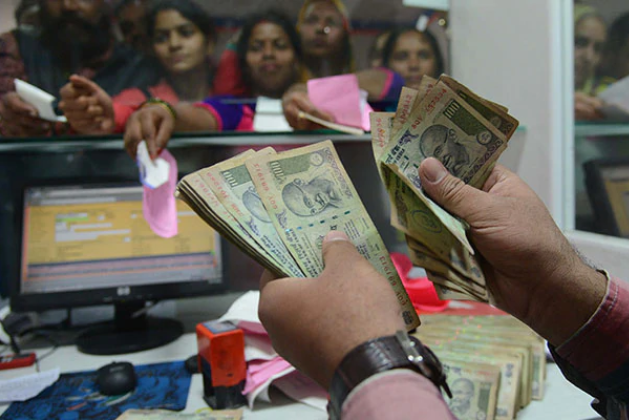Cash Deposit Limit in Saving Account as Per Income Tax
The cash deposit limit in savings accounts refers to the maximum amount of cash that an individual can deposit within a given period without attracting the attention of tax authorities. This limit is established by income tax regulations to monitor and regulate the flow of cash transactions, thereby reducing the possibility of money laundering, tax evasion, and other illicit financial activities.
Under the Indian Income Tax Act, there are specific regulations regarding cash transactions, including deposits of large amounts. Those who deposit cash in a savings account and accumulate INR 10 lakhs or more during a tax year must notify the tax authorities. For those with current accounts, this reporting limit is increased to INR 50 lakhs.
It is important to note that while these deposits are not subject to immediate taxation, financial institutions are required to report transactions that exceed these limits to the Income Tax Department.
Section 194N
Regarding cash withdrawals, the rules regarding withholding tax (TDS) are outlined in Section 194N of the Indian Income Tax Act. The law stipulates that withdrawals exceeding INR 1 crore within a tax year incur a 2% TDS. For individuals who have not filed their income tax return in the last three years, a 2% TDS applies to cash withdrawals exceeding INR 20 lakhs, while a 5% TDS applies to amounts withdrawn exceeding INR 1 crore in the same tax year.
It should be noted that TDS deducted under Section 194N is not classified as income but can be used as a credit when filing an income tax return (ITR).
Section 269ST
Section 269ST of the Income Tax Act stipulates penalties for individuals who receive INR 2 lakhs or more in cash within a specific year or transaction. However, this penalty does not apply to bank withdrawals, although TDS deductions do apply to withdrawals exceeding the prescribed limits.
269SS and 269T
The regulations set forth in Sections 269SS and 269T of the Income Tax Act apply to cash loans. Accepting or repaying cash loans exceeding INR 20,000 in a given year may incur penalties equivalent to the loan amount.
It is prudent to stay up-to-date with the latest income tax regulations and guidelines to ensure compliance and proper management of cash transactions within the framework of the law.
How is cash deposited in a bank account taxed?
Under the provisions of the Indian Income Tax Act, there are specific regulations regarding cash transactions, including large cash deposits. Those who deposit cash in a savings account and accumulate INR 10 lakhs or more during a fiscal year must notify the tax authorities. For those with current accounts, this reporting threshold is raised to INR 50 lakhs. It is important to recognize that while these deposits are not subject to immediate taxation, financial institutions are required to report transactions exceeding these thresholds to the Income Tax Department.
Regarding cash withdrawals, the TDS rules are outlined in Section 194N of the Indian Income Tax Act. The law dictates that withdrawals exceeding INR 1 crore within a fiscal year incur a 2% TDS. For individuals who have not filed their income tax return in the last three years, a 2% TDS applies to cash withdrawals exceeding INR 20 lakhs, while a 5% TDS applies to withdrawals exceeding INR 1 crore in the same tax year.
It should be noted that TDS deducted under Section 194N is not classified as income, but can be used as a credit when filing an Income Tax Return (ITR).
44AD/44ADA
In a business context, deposits that meet the turnover declared in the income tax return, particularly those covered by Sections 44AD/44ADA, are exempt from penalties. Conversely, deposits unrelated to business operations may be subject to penalties from the Revenue Department.
The Revenue Department has the power to issue notices under Section 68 of the Income Tax Act when individuals cannot verify the source of their income. If the source of income is not verified, a 60% tax, a 25% surcharge, and a 4% levy are applicable.
In addition, Section 269ST of the Income Tax Act stipulates penalties for individuals who receive INR 2 lakhs or more in cash in a specific year or transaction. However, this penalty does not apply to bank withdrawals, although TDS deductions do apply to withdrawals above the prescribed limits.
The regulations set forth in Sections 269SS and 269T of the Income Tax Act apply to cash loans. Accepting or repaying cash loans exceeding INR 20,000 in a given year could result in penalties equivalent to the loan amount.
It is prudent to stay up-to-date with the latest income tax regulations and guidelines to ensure compliance and proper handling of cash transactions in accordance with the law.
Other Limits for Cash Transactions
Below are some other common transaction types in the banking sector:
Cash Deposit Limit in Current Accounts
In current accounts, which are primarily used by businesses for day-to-day transactions, the cash deposit limit is typically higher than in savings accounts. This is because businesses handle larger volumes of cash due to their operational nature.
However, specific limits may vary depending on the bank and the company’s financial activities. For example, the cash deposit limit at SBI for current accounts is INR 5 lakhs to INR 100 crores per month. At HDFC, it is INR 60 lakhs or ten times the current monthly balance (CMB). Once this limit is exceeded, the bank may charge the depositor interest.
Cash Transaction Limit
In addition to cash deposits, there are also cash transaction limits that regulate other types of financial activities. These limits are designed to track and monitor transactions involving substantial amounts of cash. These transactions can include cash withdrawals, transfers, and payments. Cash transactions are restricted by Section 269ST and can only reach a maximum of INR 200,000 per day. All banks conduct cash transactions below this value.
Cash Withdrawal Limit
Cash withdrawal limits are in place to ensure that large cash withdrawals are reported to the relevant authorities. While these limits may vary by bank and account type, they are generally implemented to prevent illegal activities such as money laundering and tax evasion.
If an individual holds three separate bank accounts at three different banks, they could withdraw a cumulative amount of INR 100 million from each bank, for a total withdrawal of INR 300 million, without incurring any TDS consequences.
Cash Gift Limit
Income tax regulations also set the limit for cash gifts that can be given without incurring tax. This is intended to prevent individuals from using cash gifts to evade taxes by disguising taxable income as gifts.
Under current tax regulations, not all gifts received in India are subject to tax. The Income Tax Act of 1961 includes crucial provisions that facilitate the receipt of multiple gifts exempt from tax.
For example, if you receive gifts or monetary funds equal to or less than INR 50,000 in a single tax year, you are not required to pay gift tax.
Similarly, if you receive gifts from sources such as your parents, spouse, siblings, or other immediate family members, including your in-laws, you are exempt from any tax liability. This gift tax exemption applies regardless of the value of the gifts received.
Fixed Deposit Limit
Fixed deposits, a popular investment option, also have specific rules regarding cash deposits. These rules establish the maximum amount that can be deposited in a fixed deposit account, ensuring transparency and regulatory compliance.
Tax-saving fixed deposits offer a versatile investment opportunity, with a minimum entry threshold of INR 100. At the higher end of the spectrum, investors can allocate up to INR 1.5 lakh per fiscal year to these deposits, thus taking advantage of potential tax benefits.
Credit Card Bill Payment Limit
For credit card bill payments made in cash, limitations may apply to prevent the use of cash to settle extremely high credit card bills.
For credit card (VISA) bill payments through SBI, the per diem limit is INR 50,000, with a per-transaction limit of INR 25,000, and with HDFC, it is INR 49,000. The bill payment limit is virtually the same for all banks.
Real Estate Transaction Limit
In real estate transactions, especially for property purchases, cash is sometimes used for clandestine transactions. To counter this, there are limits on the amount of cash that can be transacted in real estate transactions, ensuring that such transactions are properly documented and taxed.
In India, cash transactions related to real estate purchases are subject to strict regulations and limitations as part of the government’s efforts to combat black money and promote transparency in the real estate sector. The government has set a limit on all-cash real estate transactions, beyond which the use of cash is prohibited.
Savings Account Transaction Limit Year without Tax
There is no fixed limit on the number of transactions that can be made from a savings account. However, there are limits on the amount of money that can be deposited or withdrawn without incurring tax regulations or oversight by the Income Tax Department.




Leave a comment